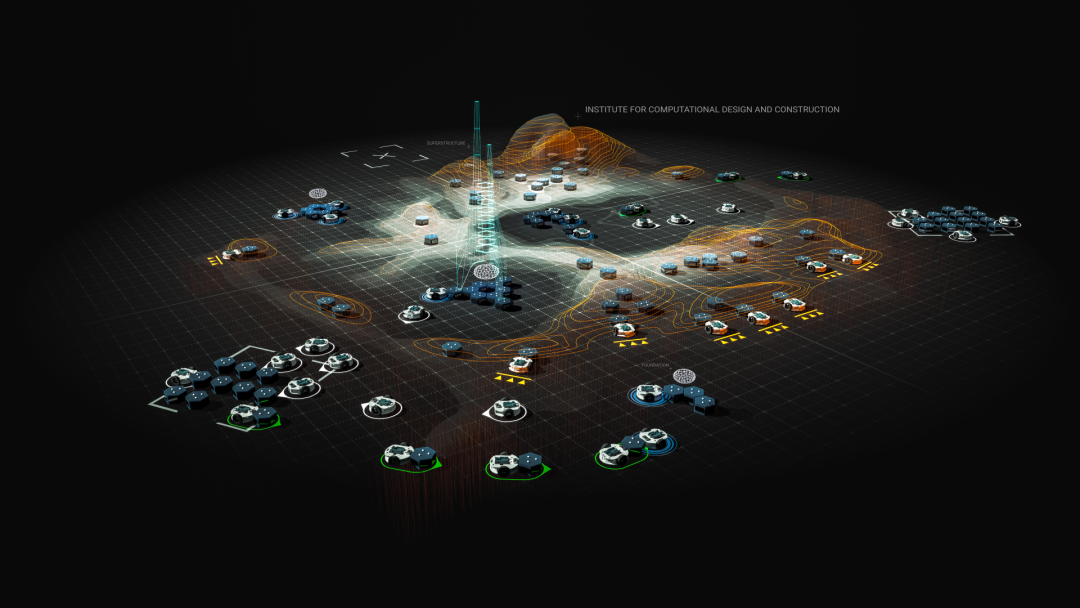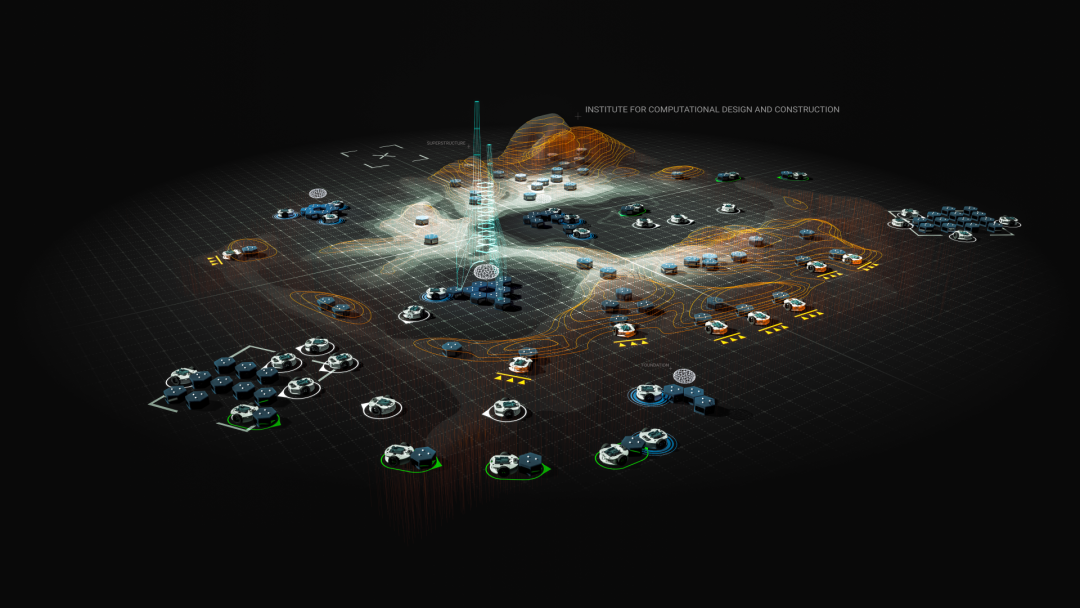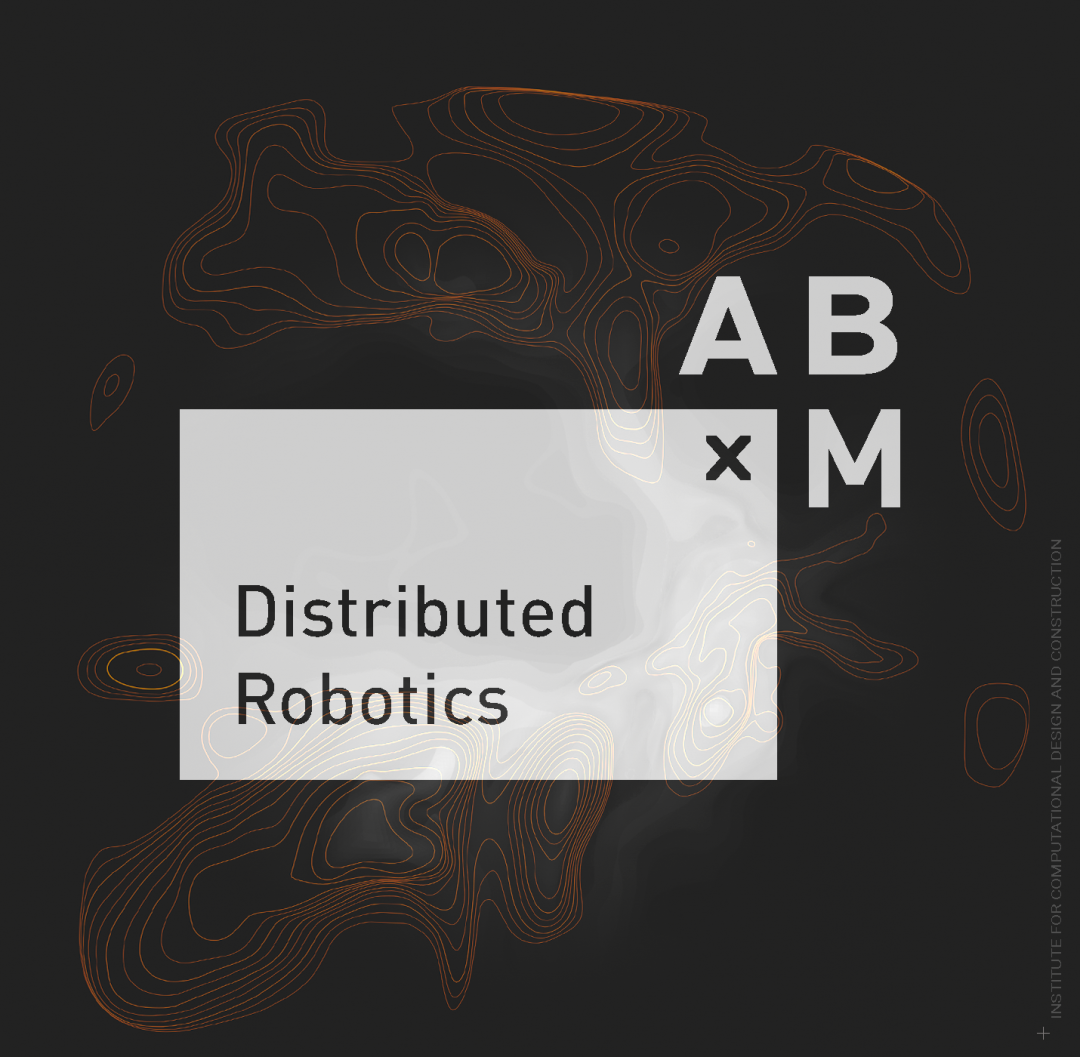新闻中心



基于代理的
集群机器人建造实验
计算性设计| 线下工作营 | 英文

主题
在这个工作坊中,参与者将探索建筑自动化中的新兴领域,名为集体机器人施工(CRC)。CRC是一种自动化方法,涉及许多小型机器人的协作完成建筑任务。虽然控制CRC系统的方法有所不同,但这个工作坊将专注于以基于代理的建模和仿真(ABMS)作为一种协调地面机器人群体的方法。因此,每个移动机器人被建模为具有个体和/或集体行为的数字代理,这些行为控制物理机器人的移动,并导致在物理空间中组装或重新排列建筑元素。
内容
在工作坊的前半部分,参与者将介绍CRC和ABMS领域。在CRC方面,参与者将介绍该领域内的现有研究,并将亲身体验一个轮式移动机器人的组装和操作。在ABMS方面,参与者将介绍ICD创建的交互式基于代理的建模框架ABxM。这将涉及到在Rhinoceros 3D和Grasshopper中使用ABxM进行讲座和亲身体验的教程。
在工作坊的后半部分,学生将被分成团队,以便尝试开发他们自己的基于代理的模型。首先,这将通过纯数字开发进行探索,学生将创建代理行为,确定代理如何相互作用以及与环境互动。这将涉及协商哪些刺激或环境信息在物理空间中表达,哪些在数字空间中表达。然后,参与者开发的模型将被用于协调一群物理移动机器人。参与者参加后,将具有CRC的一般理解,更具体地了解如何利用ABMS为由多个移动机器人组成的自动化建筑系统的设计和控制提供帮助。
所需技能
熟练使用Grasshopper,C#或Python编程
所需软件
Windows, Rhinoceros 3D/Grasshopper, Visual Studio Community
所需硬件
笔记本电脑
人数限制
10~15人
日程安排
DAY 1
2023/6/25
课程介绍和现场演示,CRC介绍,ABM介绍
DAY 2
2023/6/26
高级ABM概念讲座,辅导课程
DAY 3
2023/6/27
ICD的ABM研究讲座,辅导课程
DAY 4
2023/6/28
移动机器人介绍,ABM开发
DAY 5
2023/6/29
AMB开发,辅导课程
DAY 6
2023/6/30
实物实验,展览准备
团队背景

ICD是斯图加特大学建筑系下的研究所,全称为计算设计和建造研究所(Institute for Computational Design and Construction)。ICD致力于利用计算机科学和数字技术来推动建筑和工程领域的创新,开发新的设计和建造方法,以及创造高度复杂的结构和空间。该研究所的研究领域包括数字建筑设计、机器人技术、可持续建筑、数字建造等,其目标是在建筑和工程领域推动技术的发展和创新。ICD还与工业合作伙伴和其他学术机构合作,探索和实现未来建筑和工程的发展方向。
ICD (Institute for Computational Design and Construction) is a research institute under the Department of Architecture at the University of Stuttgart. It is dedicated to advancing innovation in the fields of architecture and engineering through the use of computer science and digital technologies, developing new methods of design and construction, and creating highly complex structures and spaces. The research areas of the institute include digital architecture design, robotics technology, sustainable architecture, digital manufacturing, among others, with the goal of driving technological development and innovation in the fields of architecture and engineering. ICD also collaborates with industrial partners and other academic institutions to explore and realize the future direction of architecture and engineering.
导师团队
Achim Menges
ICD, University of Stuttgart
Full professor
Director of ICD
Achim Menges是法兰克福的注册建筑师,也是斯图加特大学的全职教授,他是计算设计和建造研究所(ICD)和建筑综合计算设计和建造卓越集群(IntCDC)的创始主任。此外,他曾担任哈佛大学研究生院建筑系的访问教授,并在欧洲和美国担任过多个访问教授职务。他毕业于伦敦建筑协会(AA School of Architecture),并获得荣誉学位,随后在该校研究生院和AA文凭学院担任工作室大师和单位大师的教学工作。
Achim Menges is a registered architect in Frankfurt and full professor at the University of Stuttgart, where he is the founding director of the Institute for Computational Design and Construction (ICD) and the director of the Cluster of Excellence Integrative Computational Design and Construction for Architecture (IntCDC). In addition, he has been Visiting Professor in Architecture at Harvard University’s Graduate School of Design and held multiple other visiting professorships in Europe and the United States. He graduated with honours from the Architectural Association, AA School of Architecture in London, where he subsequently taught as Studio Master and Unit Master in the AA Graduate School and the AA Diploma School.
Philipp Kragl
ICD, University of Stuttgart
Research Associate
Philipp KragI是斯图加特大学计算设计和建造研究所(ICD)的研究助理,他正在开发分布式机器人领域的机器人系统。在加入ICD之前,Philipp在Trumpf SE&Co.KG接受了专业培训,他在最先进的“极端紫外线”辐射系统(EUV)的激光前置放大器上担任机电一体化工程师。他在Pforzheim设计学院获得了工业设计学士学位,并在学习期间在德国航空航天中心(DLR)应用航空研究中心(ZAL)完成了实习。他的学士论文与保时捷合作,而在完成硕士学习期间,他继续在计算设计团队中工作。Philipp毕业于斯图加特大学的综合技术和建筑设计研究硕士项目(ITECH)。他的硕士论文提出了一种新型的非定型建筑集群机器人施工(CRC)系统。
Philipp KragI is a research associate at the Institute for Computational Design and Construction (ICD) at the University of Stuttgart, where he is developing robotic systems for the research area of Distributed Robotics. Prior to joining ICD, Philipp did his professional training at Trumpf SE & Co. KG., where he worked as a mechatronics engineer on the laser preamplifier of the state-of-the-art Extreme Ultra Violet Radiation System (EUV). He obtained his Bachelor of Arts degree in Industrial Design from Hochschule für Gestaltung Pforzheim. During his studies, he completed an internship at the German Aerospace Center (DLR) at the Center of Applied Aeronautical Research (ZAL) in Hamburg. His bachelor's thesis was developed in collaboration with Porsche, at which he continued to work in the computational design team during the completion of his master's studies. Philipp graduated from the M.Sc. Program Integrative Technologies and Architectural Design Research (ITECH) at the University of Stuttgart. His master's thesis introduced a novel Collective Robotic Construction (CRC) system for amorphous construction.
Samuel Leder
ICD, University of Stuttgart
PhD Candidate
Samuel是斯图加特大学计算设计和建造研究所的博士候选人。他拥有华盛顿大学圣路易斯分校建筑设计学士学位(summa cum laude)和系统科学与工程学士学位(magna cum laude)。他通过斯图加特大学的综合技术和建筑设计研究(ITECH)项目获得了建筑科学硕士学位,并获得了德国学术交流中心(DAAD)杰出成就奖和德国奖学金。他的硕士论文与Ramon Weber合作,并获得2019年Hochschulpreis Holzbau特别奖。在加入研究所之前,Sam曾在德国慕尼黑担任建筑师,在旧金山以外的一家平面设计/品牌公司担任设计师。他目前在ICD进行的研究是卓越集群IntCDC的一部分,旨在实现建筑的综合计算设计和建造。作为集群的一部分,Sam目前的研究兴趣在于创建定制的分布式机器人系统,用于现场施工。他的工作探讨了创造复杂空间结构所需的最小机器的概念,重点研究机器的共同设计和其产生的结构设计。
Samuel is a doctoral candidate at the Institute for Computational Design and Construction at the University of Stuttgart. He holds a Bachelor of Design in Architecture, summa cum laude, as well as a Bachelors of Applied Science in Systems Science and Engineering, magna cum laude, from Washington University in St. Louis. He received a Masters in Science in Architecture through the Integrative Technologies and Architectural Design Research (ITECH) program at the University of Stuttgart. During which he was a recipient of both German Academic Exchange Service (DAAD) Award for Outstanding Achievement and the Deutschlandstipendium. His Master’s thesis together with Ramon Weber was awarded a sonderpreis through the Hochschulpreis Holzbau 2019. Before joining the Institute, Sam worked as an architect in Munich, Germany as well as a designer at a graphic design/ branding firm outside of San Francisco, CA. His current research at ICD is part of the EXC 2120: Cluster of Excellence IntCDC – Integrative Computational Design and Construction for Architecture. As part of the Cluster, Sam’s current research is interested in the creation of bespoke distributed robotic systems for on-site construction. His work explores the notion of the minimal machine required to create complex spatial assemblies and specifically on the co-design of the machines and the design of structure they produce.
案例


ABM Distributed Robotics
Workshop Admission
Experiments in Agent-Based Collective Robotic Construction
Computational Design | Physical Workshop | EN
TOPIC
In this workshop, participants will explore the emerging field within construction automation entitled Collective Robotic Construction (CRC). CRC is an automation approach which involves the collaboration of many small robotic machines for the completion of construction tasks. Although there are different methods for the control of CRC systems, this workshop will focus on agent-based modelling and simulation (ABMS) as an approach for the coordination of a swarm of ground robots. Each mobile robot is therefore modeled as digital agent with individual and/or collective behaviors that control the movements of the physical robot and result in the assemble or rearrangement of building elements in physical space.
CONTENT
In the first half of the workshop, participants will be introduced to the fields of CRC and ABMS. On the CRC side, participants will be introduced to existing research within the field and will have hands-on experience with the assembly and operation of a wheeled mobile robot. On the AMBS side, participants will be introduced to ABxM, an interactive agent-based modelling framework created by the Institute for Computational Design and Construction (ICD). This will involve both lectures and hands-on tutorials using ABxM inside of Rhinoceros 3D and Grasshopper.
In the second part of workshop, students will be split into teams in order to experiment with the development of their own agent-based model. First, this will be explored with purely digital development in which students will create agent behaviors which determine how the agents interact with one another and their environment. This will involvement negotiating which stimuli or environmental information are expressed in physical space and which in digital space. The models developed by the participants will then be implemented for the coordination of a fleet of physical mobile robots. After participation students will have a general understanding of CRC and more specifically of how ABMS can be utilized for the design and control of automation construction systems composed of multiple mobile robots.
REQUIRED SKILLS
Advanced Grasshopper, Programming skills with C# or Python
REQUIRED SOFTWARE
Windows, Rhinoceros 3D/Grasshopper, Visual Studio Community
REQUIRED HARDWARE
Laptop
NUMBER OF PARTICIPANTS
Maximum number of participating students: 10 -15
Schedule
DAY 1
2022/6/25
Introduction to coursework + Live Demonstration, Introduction to CRC, Introduction to ABM
DAY 2
2022/6/26
Advanced ABM concepts (lecture), Tutorial session
DAY 3
2022/6/27
ABM research at ICD (lecture), Additional tutorial session
DAY 4
2022/6/28
Mobile Robot Introduction, ABM Development
DAY 5
2022/6/29
ABM Development/ Support Session
DAY 6
2022/6/30
Physical Experiments / Exhibition Preparation